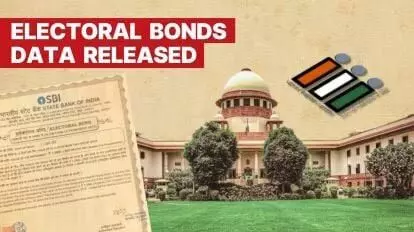Political Funding Transparency Takes a Step Forward: Election Commission Uploads Electoral Bond Data

The Election Commission of India (ECI) uploaded data on electoral bonds received from the State Bank of India (SBI) on its website. This move, a day before the Supreme Court deadline, sheds some light on political funding in India.
The data covers purchases of electoral bonds between Rs. 1,000 and Rs. 1 crore from April 12, 2019, onwards. It reveals participation from both companies and individuals. However, a key limitation exists: the ECI website provides two separate lists.
The EC's website has two lists. The first is of companies that purchased electoral bonds, along with the denomination and dates. The other has names of the political parties as well as the denominations of the bonds and the dates on which they were encashed. There is, however, no way of correlating the lists and finding out which company or individual had donated to which party.
The company that contributed the most through the method is Future Gaming and Hotel Services PR, which bought bonds worth ₹ 1,368 crore. Megha Engineering And Infrastructures Limited was second, purchasing bonds worth ₹ 966 crore.
At ₹ 410 crore, Qwik Supply Chain Private Limited was a distant third, followed by Vedanta Limited at ₹ 400 crore and Haldia Energy Limited at ₹ 377 crore.
Announcing that it has released the data, the poll body said in a statement, "The Election Commission of India has today uploaded the data on electoral bonds on its website as received from SBI on 'as is where is basis'".
"It may be recalled that in the said matter, ECI has consistently and categorically weighed in favour of disclosure and transparency, a position reflected in the proceedings of the Hon'ble Supreme Court and noted in the order also," it said.
Bharti Group is sixth, having donated ₹ 247 crore, followed by Essel Mining And Inds Ltd at ₹ 224 crore. The remaining three in the list of top 10 donors are Western UP Power Transmission Company Limited, which contributed ₹ 220 crore, Keventer Foodpark Infra Ltd, which gave ₹ 195 crore, and Madanlal Ltd at ₹ 185 crore.
The parties that encashed electoral bonds include the BJP, Congress, Trinamool Congress, AAP, Samajwadi Party, AIADMK, BRS, Shiv Sena, TDP, YSR Congress, DMK, JDS, NCP, JDU and RJD.
Transparency Concerns Linger
While the data release marks a step towards transparency, concerns remain. Advocate Prashant Bhushan, representing the Association for Democratic Reforms in the electoral bonds case, highlighted the absence of serial numbers for the bonds. This crucial information is necessary to establish which donor contributed what amount to which party. Bhushan further argues that the Supreme Court order implicitly mandated non-anonymous contributions.
Supreme Court's Warning
The Supreme Court played a significant role in this process. During a hearing, a bench led by Chief Justice DY Chandrachud reprimanded SBI for its "wilful disobedience" regarding data submission to the ECI by the designated deadline (March 6th). The court threatened contempt proceedings if SBI failed to comply and directed the bank's chairman and managing director to file an affidavit upon compliance.
SBI, which is India's largest bank, had submitted the data on Tuesday and filed the affidavit in the court the day after that. The affidavit stated that 22,217 electoral bonds were issued between April 2019 and February 15, 2024, before the Supreme Court struck down the scheme after declaring it unconstitutional and arbitrary.
The bank said political parties had redeemed 22,030 bonds while the remaining 187 were redeemed and the money was deposited in the Prime Minister's national relief fund, in accordance with the rules.
The Supreme Court is scheduled to hear a petition filed by the ECI on the electoral bonds order on Friday. This development is likely to shed further light on the future of political funding transparency in India.
